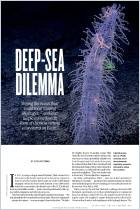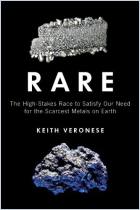Join getAbstract to access the summary!

Join getAbstract to access the summary!
Maddie Stone
The Future of Technology Is Hiding on the Ocean Floor
Gizmodo, 2016
What's inside?
The seabed is rich with rare earth metals – the materials that make smartphones, laptops and certain cancer drugs possible.
Recommendation
Deep in the ocean, lying on the seabed, you’ll find vast fields of manganese nodules filled with rare earth metals – the materials that make smartphones, laptops and certain life-saving medications possible. Journalist Maddie Stone highlights the manifold uses of these metals, and, recognizing them as a finite resource, details the growing demand for them that could lead to deep-sea mining. getAbstract recommends this article to businesses interested in investing in deep-ocean research, as well as to scientists and environmentalists concerned about the negative impact that such activities could have on entire ocean ecosystems.
Summary
About the Author
Maddie Stone is a staff writer at Gizmodo, a design and technology blog that features articles on the latest science and technology applications.






















Comment on this summary